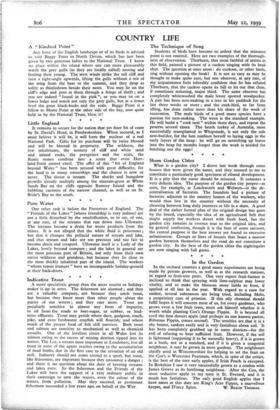In the Garden
In the orchard counties a good many experiments are being made by private growers, as well as at the research stations, in regard to fruit-tree pests. One very expert fruit-farmer is inclined to think that spraying with lime-sulphur may lower vitality, and so make the blossom more liable to frost, if applied at all late in the year. With regard to a cure for canker, several substances are being tried, including Melo, a proprietary cure of promise. If this oily chemical should fulfil hopes it will concern most of us, for every gardener, who grows even a few fruit trees, must ask himself whether it is worth while planting Cox's Orange Pippin. It is beyond all cavil the best dessert apple (and perhaps its one known parent, Ribstone Pippin, comes second). The troubles are that it is a shy bearer, cankers easily and is very fastidious about soil. It has been completely grubbed up in some districts—for the evil of refusing to bear sufficient fruit. However, if the soil is lightened (supposing it to be naturally heavy), if it is grown as a bush, not as a standard, and if it is given a congenial neighbour, it may be grown in most gardens. The neighbours chiefly used in Worcestershire for helping to set the fruit on the Cox's is Worcester Pearmain, which, in spite of the critics, is the best of the very early apples, if Irish Peach is excepted. In Berkshire I saw it very successfully grown as a cordon with James Grieve as its fertilising neighbour. After the Cox, the most seductive apple to my taste is St. Everard, and it is much less fastidious. The only good English apples that I have eaten at this date are King's Acre Pippin, a marvellous


















































 Previous page
Previous page